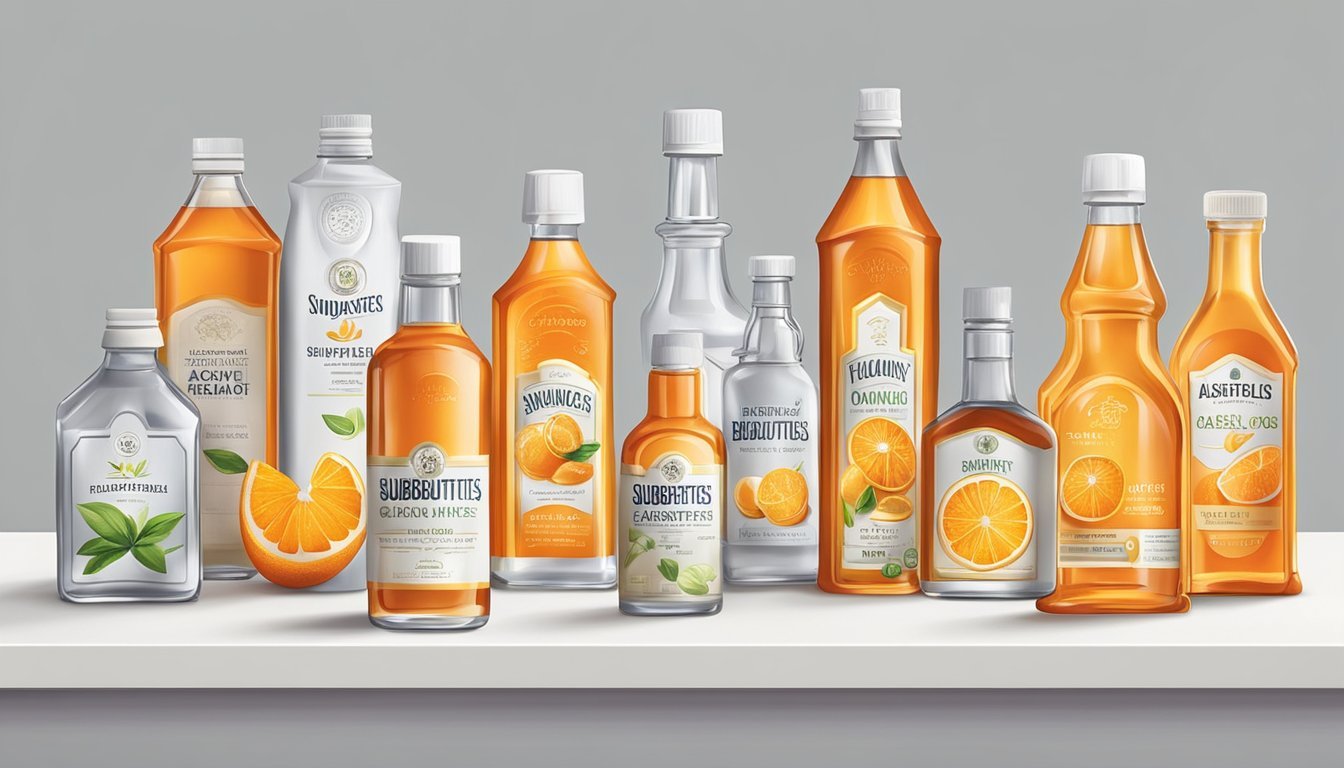Orange Extract Substitutes
Top Alternatives for Citrus Flavors
Orange extract is a concentrated flavoring used to impart the essence of orange in a variety of culinary applications. It's a staple in the arsenal of ingredients available to both professional chefs and home bakers. The robust flavor of orange extract can elevate the taste of cakes, cookies, glazes, and a host of other desserts. Its concentrated nature means that only small amounts are typically needed to achieve the desired citrus note in recipes.
However, there are occasions when orange extract might not be readily available in the kitchen pantry. Fortunately, a number of alternatives can be used to achieve a similar flavor profile. Some substitutes, like orange zest or orange juice, come from the fruit itself and offer a fresh and natural taste. Others, such as orange marmalade or orange oil, provide additional nuances to dishes, ranging from a subtle bitterness to a more pronounced sweetness. The key to a successful substitution is understanding the potency and characteristics of these alternatives, ensuring they blend seamlessly into the cooking or baking process without overpowering the recipe.
Understanding Orange Extract
Composition and Properties
Orange extract is composed primarily of orange oil, an essential oil derived from the skin of oranges. The process typically involves cold pressing or steam distillation, focusing on capturing the vibrant flavor profile of the fruit. The extract consists of a blend of food-grade orange oil and a carrier, often alcohol, acting as a stabilizer and preservative. This combination results in a highly concentrated flavoring agent, with the concentration of orange oil to alcohol determining the strength of the extract.
Orange Oil Composition: > 90% of total extract
Carrier (Often Alcohol): < 10% of total extract
The characteristics of orange extract include a versatile citrus essence and a robust, slightly bitter and sweet flavor due to its concentration.
Culinary Uses
Orange extract is used to infuse foods and beverages with a distinct orange flavor without adding the additional moisture that would come from using orange juice. It's an integral ingredient for various recipes, from baked goods like cookies and cakes, to glazes, marinades, and even certain cocktails. Due to its potency, orange extract needs to be used sparingly in dishes to avoid overpowering other flavors.
Baked Goods: Cookies, Cakes, Frostings
Glazes: For meats or vegetables
Beverages: Speciality cocktails, flavoring for water or sodas
Its application in cooking is a testament to its versatility and the depth of flavor it can bring to both sweet and savory dishes. Food-grade orange oil within the extract is generally recognized as safe for culinary uses, making it a popular choice for flavoring.
Substitutes Overview
When looking for substitutes for orange extract, one must consider both the desired flavor and the availability of alternatives. The following sections outline the key criteria for selecting an appropriate substitute and discuss commonly available alternatives.
Criteria for Substitution
The primary consideration for selecting a substitute for orange extract is maintaining the distinctive citrus flavor in the final dish. The intensity and authenticity of flavor are paramount, as substitutes should ideally offer a similar aromatic profile. Additionally, one must account for the substitute’s form, whether liquid, zest, or other physical states, to ensure it integrates well with the recipe's texture.
Availability and Common Alternatives
Orange extract substitutes are chosen based upon their accessibility and how well they mimic the extract's bright, tangy essence. Here are a few standard options:
Orange Zest: Offers a robust flavor without additional moisture. Use a ratio of 1 teaspoon of orange extract to 1 teaspoon of zest.
Orange Juice: For liquid recipes where additional moisture is not a concern. Double the quantity, using 2 teaspoons of juice for every 1 teaspoon of extract.
Orange Marmalade: A sweet and slightly bitter option for desserts. It incorporates both orange rind and juice.
Orange Oil: A concentrated flavor source. Use ½ teaspoon oil per 1 teaspoon extract.
Mandarin Orange: Use the pureed fruit for its fragrant and intense citrus flavor in baked goods.
Substitutes should be chosen based on these criteria, with adjustments made as necessary to preserve the recipe's intended taste and consistency.
Citrus-Based Substitutes
In the realm of baking and cooking, the vibrant zest and tang of orange extract can be replicated with a variety of citrus-based substitutes. This section explores some effective alternatives derived from citrus fruits to maintain the intended flavor profile in recipes.
Orange Juice and Zest
Orange Juice: For a teaspoon of orange extract, an easy swap is two teaspoons of orange juice. This alternative adds a mild, sweet citrus flavor and additional moisture, which may be suitable for liquid-based recipes like marinades or dressings.
Orange Zest: Fresh orange zest offers a concentrated burst of citrus essence. Use one teaspoon of zest to replace a teaspoon of orange extract in your recipes, ensuring the unmistakable flavor of orange remains prominent without altering the recipe's liquid ratio.
Other Citrus Extracts
Lime Extract: A potential alternative with a sharp, tangy profile.
Grapefruit Extract: Provides a slightly bitter and complex citrus note.
Bergamot Orange: A less common but nuanced option with a floral, lemon-orange flavor.
When replacing orange extract, start with a one-to-one substitution ratio and adjust to taste, as these extracts can vary in intensity.
Citrus Liqueurs
Orange Liqueur: A sophisticated substitute like orange liqueur can be used in desserts for an adult twist. Scale back other liquids to maintain the recipe's consistency.
Other liqueurs with a citrus base may also be suitable, but they often contain alcohol, which should be considered based on the recipe and desired outcome.
Alcohol-Based Substitutes
In seeking an alternative to orange extract, alcohol-based options provide a potent flavor and versatility for various culinary applications.
Using Liqueurs
Liqueurs offer a concentrated citrus essence that closely mimics the intensely flavored profile of orange extract. Grand Marnier and Cointreau are top-tier choices; both are rich in orange flavor with the former delivering a cognac base and the latter a pure, clear spirit. Typically, half a teaspoon of these liqueurs can effectively replace one teaspoon of orange extract.
Grand Marnier: Use in fine desserts and specialty cocktails.
Cointreau: Suitable for a wide range of baking recipes and glazes.
Triple Sec and Curacao are also suitable; these are slightly less nuanced but still provide a robust orange flavor. They are particularly useful in recipes where a subtle alcohol note complements the dish.
Triple Sec: With a 15-30% alcohol range, it's versatile for various baking needs.
Curacao: Known for its slightly bitter taste and color variety, ideal for vibrant desserts.
Alcohol Alternatives
When a non-liqueur alcoholic substitute is necessary, vodka can be infused with orange zest to create a homemade extract-like essence. This substitutes well for orange extract when a neutral-flavored alcohol base is preferable. Rum extract is another option, although it introduces a distinctly different flavor profile compared to the light, citrusy notes of an orange liqueur.
Substitute Flavor Profile Best Used In Vodka Neutral with orange infusion Baking, Cocktails Rum Extract Sweet and sugary with a kick Desserts, Baking, Sauces
It's important to use these alternatives in moderation due to their alcohol content and to ensure they complement the overall flavor of the dish.
Non-Alcoholic Substitutes
When cooking or baking requires the sweet and tangy essence of orange but without the alcohol, there are several non-alcoholic substitutes that adequately mimic the flavor profile of orange extract. These alternatives offer a diverse range of options catering to different recipe requirements.
Juice Concentrates
Orange Juice Concentrate: It serves as a direct substitute offering a potent burst of citrus flavor. A general guideline for substitution is:
2 tablespoons of orange juice concentrate for every 1 teaspoon of orange extract.
The concentrate should first be thawed, and the quantity can be adjusted to match the desired flavor intensity.
Other Citrus Juices: For a more nuanced citrus note, one might consider:
Lemon extract, which provides a bright, tangy flavor.
Orange zest oil, which imbues dishes with a fresh, zesty aroma.
Essential Oils and Extracts
Orange Essential Oil: This highly concentrated oil derived from orange peels provides a strong orange aroma. It is potent, so one should start with:
A drop or two in place of a teaspoon of orange extract, adjusting as needed.
Vanilla Extract: While not citrus-flavored, it adds a sweet and comforting note that can complement other ingredients in the absence of orange extract. Use:
The same amount of vanilla extract as the orange extract called for in the recipe.
Other Flavorings
Orange Zest: Freshly grated orange zest is packed with essential oils that are perfect for infusing recipes with a pure orange flavor. Use:
1 tablespoon of orange zest for every 1 teaspoon of orange extract.
This substitute works well in various dishes, particularly baked goods and desserts where the zest can evenly distribute throughout the mixture.
Adapting Recipes for Substitutes
When substituting orange extract in recipes, it is important to consider the quantity used, the potential changes in texture and moisture, and how the substitute will harmonize with other flavors. Choosing the right substitute can enhance the desired citrus profile without compromising the integrity of desserts like cupcakes, cakes, or cookies.
Adjusting Quantities
Using a substitute for orange extract typically requires adjustments in the volume used to achieve the desired intensity of flavor. For example:
Orange Juice: To replace 1 teaspoon of orange extract, one can use 2 teaspoons of orange juice.
Orange Zest: Substituting with 1 to 2 teaspoons of zest can provide a comparable burst of flavor.
Orange Oil: A more concentrated substitute, using a ½ teaspoon can replace 1 teaspoon of extract.
Orange Liqueur: One should replace 1 teaspoon of extract with 1 tablespoon of orange liqueur, considering the added alcohol.
Consider Texture and Moisture
Substitutes can alter the texture and moisture content of baked goods. Careful consideration must be given when introducing new ingredients:
Juices and Marmalades: These can introduce more moisture, which may be beneficial for moist desserts but could potentially make the texture of cookies too soft.
Orange Zest: Offers a potent flavor with no additional liquids, making it ideal for recipes where added moisture could affect the texture.
Flavor Pairings
The chosen orange extract substitute should complement the recipe's flavor profile. Different substitutes may bring additional notes to the dish:
Marmalade: Adds a sweet yet slightly bitter flavor, suitable for both desserts and savory dishes.
Liqueur: Introduces a boozy twist which pairs well with adult-focused desserts.
Zest: Provides a natural and fresh citrus note, enhancing light and fruity recipes.
Selecting an appropriate substitute for orange extract relies on balancing flavor intensity, maintaining the desired texture, and ensuring moisture levels contribute to the ideal consistency of the final product. Each substitute can bring a unique characteristic to a recipe, from a subtle citrus undertone to a bolder, more pronounced orange presence.
Non-Traditional Substitutes
When traditional ingredients are unavailable, one can turn to less obvious, yet creative and effective options to maintain the intended flavor profile in their culinary creations.
Creative Culinary Solutions
Orange marmalade: This preserve, while sweet and tangy, brings a unique touch to recipes needing an orange essence. Providing a similar citrusy flavor, it can serve as an excellent non-traditional substitute. The best ratio to use is to substitute 1 teaspoon of orange extract with 2 teaspoons of orange marmalade.
Other citrus fruit: In the absence of orange extract, other citrus fruit can supply a comparable zest. Consider using similar quantities of lemon or lime zest to impart a fresh citrus kick where orange flavor isn't paramount.
Using Herbs and Spices
Fresh Herbs: To capture a fresh citrus note, one might use finely chopped lemongrass or a small amount of lemon verbena. Although different from the orange scent, they still contribute a refreshing citrusy aroma:
Lemongrass: subtle and fresh for light dishes.
Lemon Verbena: stronger and aromatic for a bolder presence.
Ground spices: Particularly in baking, ground coriander can evoke a mild citrus flavor. It should be used sparingly due to its potency so as not to overwhelm the intended taste of the dish.
Spice Quantity for Substitution Notes Ground Coriander Start with ¼ teaspoon for 1 teaspoon of orange extract Adjust to taste; ideal for baked goods.
These non-traditional substitutes should be chosen not just for their ability to mimic the flavor of orange extract, but also for how they harmonize with the other ingredients in the recipe.
Storage and Shelf Life
Storing orange extract and its substitutes properly is crucial to maintain their quality and flavor. Proper storage conditions can significantly extend the shelf life of these concentrated flavorings.
Storing Extracts and Substitutes
Orange extract, due to its alcohol content, can retain its quality for 3-4 years if stored in a cool, dark place. The container should be airtight to prevent the evaporation of alcohol, which contributes to the preservation of the extract. Here is how one can store orange extract efficiently:
Location: A cupboard away from heat sources such as the stove or oven.
Temperature: Ideally, the storage area should remain consistently cool.
Sunlight: Keep the extract in a dark place to prevent degradation by sunlight.
Substitutes, such as orange zest or liqueurs, have different storage requirements. Orange zest should be used fresh, although it can be stored in the refrigerator for a couple of days. Liqueurs, similar to orange extract, should be stored in a cool, dark place.
Maximizing Freshness
To ensure a substitute such as fresh orange zest retains its vibrant, citrusy flavor, use the following guidelines:
Refrigeration: Fresh orange zest should be wrapped in a damp paper towel and placed in an airtight container before storing it in the refrigerator.
Freezing: For longer storage, freezing the zest in a freezer-safe container can preserve its flavor for several months.
Here is a table summarizing the storage recommendations:
Substitute Location Container Shelf Life Orange Extract Cool, dark place Airtight container Up to 4 years Orange Zest Refrigerator Airtight container Several days to weeks Liqueurs Cool, dark place Original bottle or airtight Varies
By adhering to these storage guidelines, the freshness and concentrated flavoring of orange extract and its substitutes can be preserved, ensuring they remain a vibrant addition to culinary creations.
Specialty Applications
When it comes to using orange extract substitutes in culinary applications, it's crucial to select options that complement the flavor profile of the dish while providing a similar depth and brightness that orange extract would normally provide.
Savory Cooking Options
In savory dishes, such as chicken or fish, where orange extract might be used in marinades or sauces, one should consider substitutes that infuse the dish with a citrus undertone without overwhelming the palate. Options include:
Fresh Orange Zest: Finely grated zest imparts a fresh, zesty flavor that's particularly effective in marinades and rubs.
Orange Juice Concentrate: Ideal for glazes and sauces, offering a more concentrated orange flavor without additional liquid.
Utilizing these substitutes ensures that the foundational orange essence is present in savory creations, enhancing the dish's complexity.
Beverages and Cocktails
In the realm of beverages and cocktails, substitutes for orange extract must carefully balance flavor intensity without the alcohol base that the extract would typically provide. Consider these alternatives:
Orange Bitters: A few dashes can provide the orange accent in cocktails, enhancing the beverage with a complex, citrusy bitterness. Ideal in Old Fashioneds and other classic drinks.
Orange Zest Syrup: For non-alcoholic options or to sweeten cocktails, a syrup made with orange zest offers sweetness along with a subtle orange flavor, especially suitable for dressings and sweet sauces.
By choosing the right substitute, bartenders and home mixologists can capture the essence of the citrus flavor that orange extract imparts to both alcoholic and non-alcoholic beverages.






